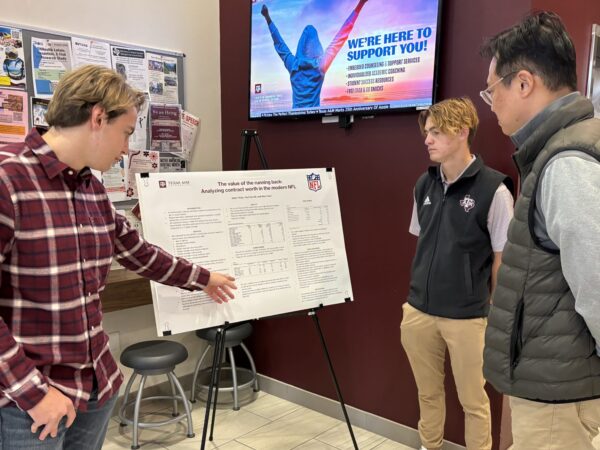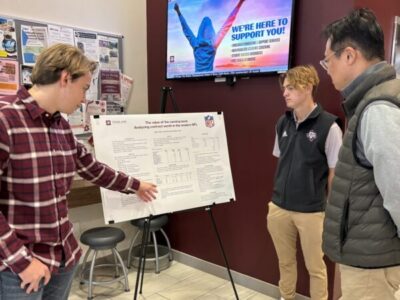Growth hormone alters brain structure and combats traumatic brain injury symptoms
Traumatic brain injuries result in death and disability in thousands of Americans each year. The effects of these injuries can linger on long after the initial trauma.
Even patients with mild TBI from things like a mild concussion, a fall, sports injury or a car wreck can experience symptoms such as fatigue, sensitivity to light and sound and cognitive impairment.
“After a TBI, patients can experience persistent symptoms, and it is not uncommon for some patients to have low growth hormone levels,” said Dr. Tray Wright, research assistant professor in the Department of Health and Kinesiology.
Wright and a team of researchers at the University of Texas Medical Branch at Galveston, including Dr. Randall Urban, have been studying how administering growth hormone relieves symptoms in these patients. In the current study, they set out to understand how growth hormone treatment might alter the physical structure of the brain, and reduce symptoms like fatigue and altered cognition.
They found that some TBI patients respond so well to the growth hormone that they experience profound improvement in fatigue, anxiety levels, sleep and body composition.
“For the large portion of patients that respond to the treatment it can be really life altering,” Wright said.
Some TBI patients experience such immense fatigue that they have to reduce their hours at work or retire completely. However, this treatment offers hope for TBI patients’ careers.
“They go from being so fatigued that they cannot hold down a job to going back to work and leading a very normal life,” Wright said.
About the study
The researchers utilized a crossover design in the study, in which all subjects received periods of both growth hormone treatment and placebo. Wright said this complicated design helped pinpoint exactly which positive results the drug was responsible for.
Patients were given recombinant human growth hormone, a manufactured growth hormone that mimics the naturally occurring kind. It was administered daily by patients with a small injectable needle.
Using MRI, they monitored changes in brain connectivity, how regions of the brain communicate with each other, as well as physical changes to the brain, including gray matter volume and cortical thickness throughout the study.
“We know that growth hormone therapy is effective for these patients, but this is a first step to determining how the brain is affected by treatment,” Wright said.
Challenges
Growth hormone is a controlled substance, sometimes used illegally by athletes for its ability to increase lean mass and decrease fat mass.
Wright said this, along with how costly the drug is, poses a challenge to making the treatment more widely available for TBI patients because insurance companies are less inclined to cover it.
Another challenge is that TBI, like other mental health diseases, can be difficult to diagnose because it may present differently from patient to patient. Some football players receive repeated blows to the head and never even develop symptoms, while other individuals may fall, hit their head once and experience intense symptoms. Wright said his team hopes to decode this in future research.
“Some of our ongoing research now is trying to figure out why some people are more susceptible than others, and also what the mechanisms might be,” Wright said.
The team hopes they can raise awareness for treatment and the long-term lingering effects that TBI patients experience.
“We want to bring hope and answers to these TBI patients that might otherwise be sitting on the sidelines with their doctors and scratching their heads not knowing what to do,” Wright said.
Dr. Melinda Sheffield-Moore, head of the Department of Health and Kinesiology, also worked on this research. View the abstract to see the full team of researchers.
About the Writer
Heather is responsible for news coverage in the Department of Health and Kinesiology, as well as the Department of Educational Administration and Human Resource Development.
Articles by HeatherFor media inquiries, contact our Media Relations Coordinator, Ashley Green
Fundraising
To learn more about how you can assist in fundraising, contact Amy Hurley, Director of Development ahurley@txamfoundation.com or 979-847-9455














